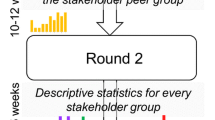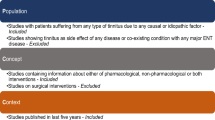Abstract
The aim of the study was to develop a self-management manual for tinnitus. The study was carried out in three phases. In phase-1, an evidence-based approach was considered by reviewing the literature to select intervention strategies that had proven to reduce tinnitus percept. Further, health literacy recommendations were used to convey the information in the manual to the patient. Phase-2 included expert committee scrutiny and assessing the understandability and actionability of the prepared self-management manual using the Patient Education Material Assessment Tool (PEMAT). In Phase-3, the self-management manual was validated from tinnitus patients. The expert committee mainly gave suggestions regarding the content, word choice and grammatical errors. PEMAT scores from patients and the expert committee revealed that activities provided in the manual are understandable and actionable. The THI and TFI scores were reduced after one month of short-term intervention. The self-management manual effectively reduced tinnitus percept and associated problems.
Similar content being viewed by others
References
Manchaiah V, Beukes EW, Granberg S et al (2018) Problems and life effects experienced by tinnitus research study volunteers: an exploratory study using the ICF classification. J Am Acad Audiol 29:936?947. https://doi.org/10.3766/jaaa.17094
Martinez C, Wallenhorst C, McFerran D, Hall DA (2015) Incidence rates of clinically significant Tinnitus: 10-Year Trend from a Cohort Study in England. Ear Hear 36:e69?e75. https://doi.org/10.1097/AUD.0000000000000121
Hallam RS (1996) Correlates of sleep disturbance in chronic distressing tinnitus. Scand Audiol 25:263?266. https://doi.org/10.3109/01050399609074965
Swain SK (2021) Impact of tinnitus on quality of life: a review. Int J Adv Med 8:1006. https://doi.org/10.18203/2349-3933.ijam20212416
Biswas R, Lugo A, Genitsaridi E et al (2021) Modifiable lifestyle-related risk factors for tinnitus in the general population: an overview of smoking, alcohol, body mass index, and caffeine intake. Prog Brain Res 263:1?24. https://doi.org/10.1016/bs.pbr.2021.04.005
Izuhara K, Wada K, Nakamura K et al (2013) Association between tinnitus and sleep disorders in the general Japanese population. Ann Otol Rhinol Laryngol 122:701?706. https://doi.org/10.1177/000348941312201107
Thirunavukkarasu K, Geetha C (2013) One-year prevalence and risk factors of tinnitus in older individuals with otological problems. Int Tinnitus J 18. https://doi.org/10.5935/0946-5448.20130023
U.S. Department of Health and Human Services, Services USD of H and H (2010) National Action Plan to improve health literacy. Heal (San Fr
Bhatt JM, Bhattacharyya N, Lin HW (2017) Relationships between Tinnitus and the prevalence of anxiety and depression. Laryngoscope 127:466?469. https://doi.org/10.1002/lary.26107
M?ller AR (2011) Epidemiology of tinnitus in adults
Henry JA, Schechter MA, Zaugg TL et al (2006) Outcomes of a clinical trial: Tinnitus masking versus tinnitus retraining therapy. J Am Acad Audiol 17:104?132. https://doi.org/10.3766/jaaa.17.2.4
Lasisi G (2011) Prevalence of insomnia and impact on quality of life among community elderly subjects with tinnitus. Ann Otol Rhinol Laryngol 120:226?230
Dineen R, Doyle J, Bench J (1997) Audiological and psychological characteristics of a group of tinnitus sufferers, prior to tinnitus management training. Br J Audiol 31:27?38. https://doi.org/10.3109/03005364000000006
Langguth B (2011) A review of tinnitus symptoms beyond ringing in the ears: a call to action. Curr Med Res Opin 27:1635?1643. https://doi.org/10.1185/03007995.2011.595781
Arnold ML, Oree P, Sanchez V et al (2019) Development and Formative Assessment of the hearing loss Toolkit for Self-Management. Semin Hear 40:49?67. https://doi.org/10.1055/s-0038-1676783
Berkman ND, Sheridan SL, Donahue KE et al (2011) Health literacy interventions and outcomes: an updated systematic review. Evid Rep Technol Assess (Full Rep) 1?941
Shoemaker SJ, Wolf M, Brach C (2014) The Patient Education materials Assessment Tool (PEMAT) and user?s guide. AHRQ Publ 67
Newman J, Spitzer (1996) Development of the tinnitus handicap inventory. Arch Otolaryngol - Head Neck Surg 122:143?148
Meikle H, Griest, et al (2012) The tinnitus functional index: development of a new clinical measure for chronic, intrusive tinnitus. Ear Hear 33:153?176
Funding
The authors acknowledge the Department of Science and Technology, Government of India, for financial support vide Reference No. DST/SATYAM/2020/413 (G) under Science and Technology for Yoga and Meditation (SATYAM) to carry out this work.
Author information
Authors and Affiliations
Corresponding author
Ethics declarations
Ethics Approval
All procedures performed in studies involving human participants were in accordance with institutional ethical standards.
Consent of Participant
Informed consent was obtained from all the participants who involved in this study.
Conflicts of Interest/Competing Interests
The authors have no conflicts of interest/Competing interests to declare.
Additional information
Publisher?s Note
Springer Nature remains neutral with regard to jurisdictional claims in published maps and institutional affiliations.
Rights and permissions
Springer Nature or its licensor (e.g. a society or other partner) holds exclusive rights to this article under a publishing agreement with the author(s) or other rightsholder(s); author self-archiving of the accepted manuscript version of this article is solely governed by the terms of such publishing agreement and applicable law.
About this article
Cite this article
Shetty, H.N., S., V. Development and Validation of Self-Management Manual for Acute Tinnitus. Indian J Otolaryngol Head Neck Surg (2024). https://doi.org/10.1007/s12070-024-04504-2
Received:
Accepted:
Published:
DOI: https://doi.org/10.1007/s12070-024-04504-2




